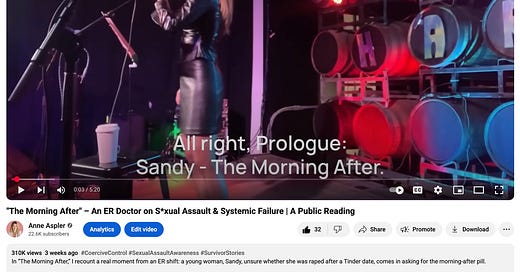The Morning After: "Sandy" | An ER Doctor on Sexual Assault & Systemic Failure
The aftermath of a Roofied Tinder date was not an uncommon part of my Sunday morning practice as an ER doctor
I did a public reading of the prologue of my unpublished book at an event for Healthcare Artists a few weeks ago. Click the link above to watch, or read in-full below. Thanks for your support and wishing you a safe summer.
PROLOGUE: SANDY - The Morning After
“I woke up with my pants down,” Sandy says, her head resting against the wall in the ER, where I’m the only female doctor on shift. Moments earlier, the nurses called me, worried she might bolt, so I rushed to see her ahead of other patients who’ve been waiting all night.
It’s 0500, the most peaceful hour in the ER—if such a thing exists. Most of the intoxicated and high people have settled into sleep. Despite blinding fluorescent lights and constant foot traffic, the hallway patients are managing some shut eye. Those in the waiting room have lost hope and passed out in chairs. The steady hum and beep of cardiac monitors feels oddly soothing.
In one of our few private rooms, twenty-one-year-old Sandy is trying to decide whether she was raped. The aftermath of a roofied Tinder date is not an uncommon part of my Sunday morning line-up. I dodged this bullet in my online dating—not because I was careful, just lucky. The inner Fundamentalist Pentecostal girl in me shudders thinking about how many open-lid alcoholic beverages I once accepted without question.
Compared to the first time I completed a sexual assault kit six years ago, I am different now. Hardened. Bitter. A traumatized female doctor who will plead with Sandy to undergo a forensic kit—even while knowing it may retraumatize her and does not guarantee the closure she deserves. She will refuse. And I will think, harshly, how it won’t matter anyway, because the legal process will only alienate her and rob her of immeasurable time and dignity. I am part of the broken system that pays lip service to helping women but offers little other than sutures, medications, and a vault where DNA evidence is stored and forgotten. Looking for emotional healing and justice? Look elsewhere.
“I went on a first date last night,” Sandy says. “I only had one drink. I don’t understand why I can’t remember what happened.” She taps her foot, avoiding eye contact. “I still had my shirt on. And when I pulled up my underwear, there was blood, but I’m not on my period.”
“It sounds like you may have been sexually assaulted.” I offer as gently and directly as possible.
She hardens her jaw. “We were at the restaurant. I was tired from a long work week. So maybe it was that? He was funny and charming. But then… he wasn’t there when I woke up.” Tears well up but she blinks them back. “I’m just here for a prescription for the morning-after pill.”
“I’ll write that for you.” I say. “But I’d also recommend collecting evidence, and doing STI testing and treatment, just in case.”
“I don't think I need that.”
The words come quickly, like saying it can make it true.
I begin my familiar, weary monologue about how, if she wants the answers she is seeking, it’s best to do the exam sooner rather than later. I want to tell her that waking up with her pants down and not knowing how she got that way is a horrifying experience that may never cease to haunt her. My recollection of that possibly happening to me is a dull, distant memory that I’m unclear about, but the terror of not knowing still grabs me.
I’ve been down this road of trying to convince a patient to undergo a kit so many times. Maybe we need a sexual assault follow-up service that goes directly to people’s homes because they feel so uncomfortable in hospitals.
Staffing emergency departments on the weekend is hard, especially in rural areas. This day, at this hour, there isn’t a social worker. So, I hastily print off information about sexual assault centers, anonymous STI screening clinics, the script she’s asked for, and others she didn’t — to treat for gonorrhea, chlamydia, and to prevent HIV transmission. Medico-legally, to treat without testing puts me at risk, but I don’t care. Someone who roofies and rapes on a Tinder date might not be responsible with their sexual health, though it’s impossible to know.
“Go home and rest,” I say. “If you decide later that you want evidence collected, you can still come back within a week. Just… don’t wash your clothes or shower yet if you can manage.”
“Thank you,” she says, “but all I need is the morning-after pill.” She leaves all the other papers behind and hurries for the exit.
I know I am good at my job.
But every time a Sandy walks out the door, I feel otherwise.
Writing this story is an attempt to transform the hurt inside me—to find a way to live with the sorrow I’ve witnessed as a female ER doctor and reckon with my own painful history. I hadn’t realized that caring for others in crisis would unearth things I’d tried to outrun: my mom, my dad, myself—and force me to figure out a way to explain it all.
Especially to my daughters.
Whom I pray never become a Sandy.





